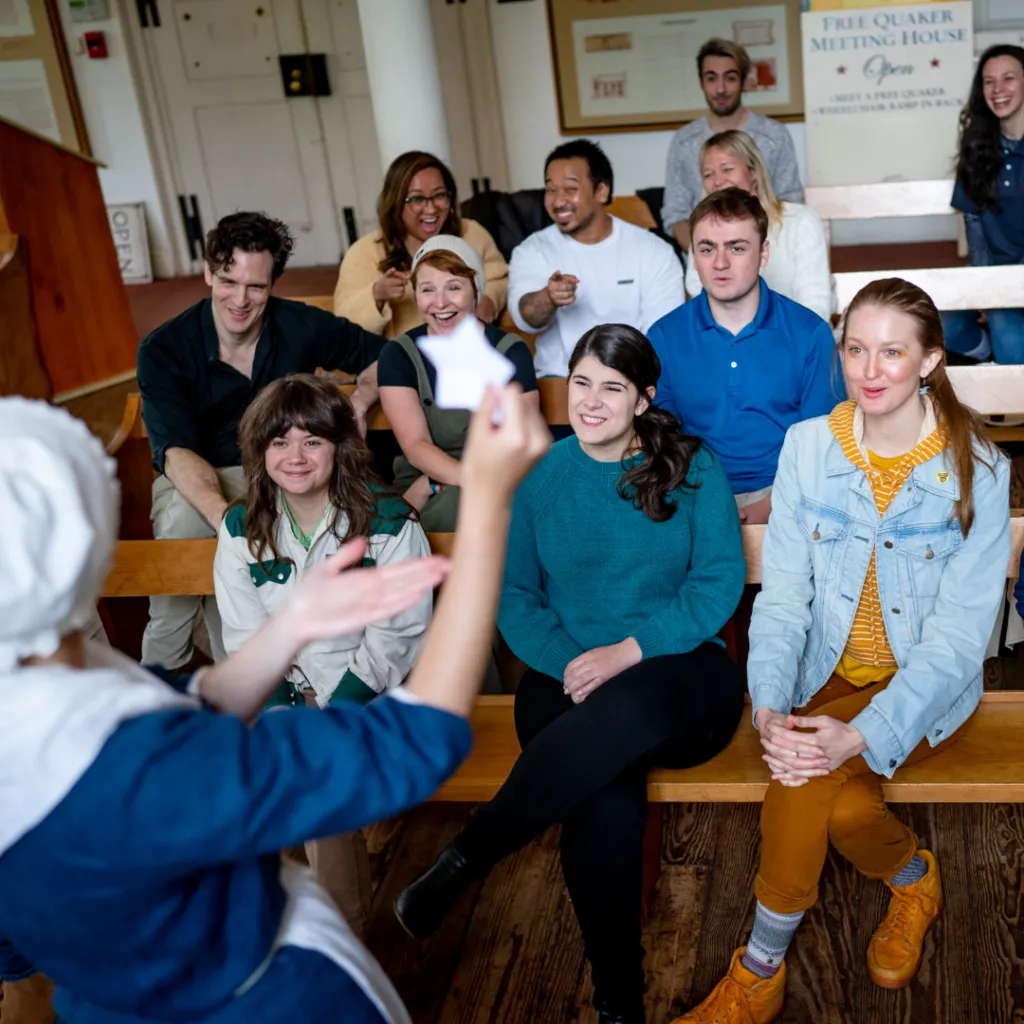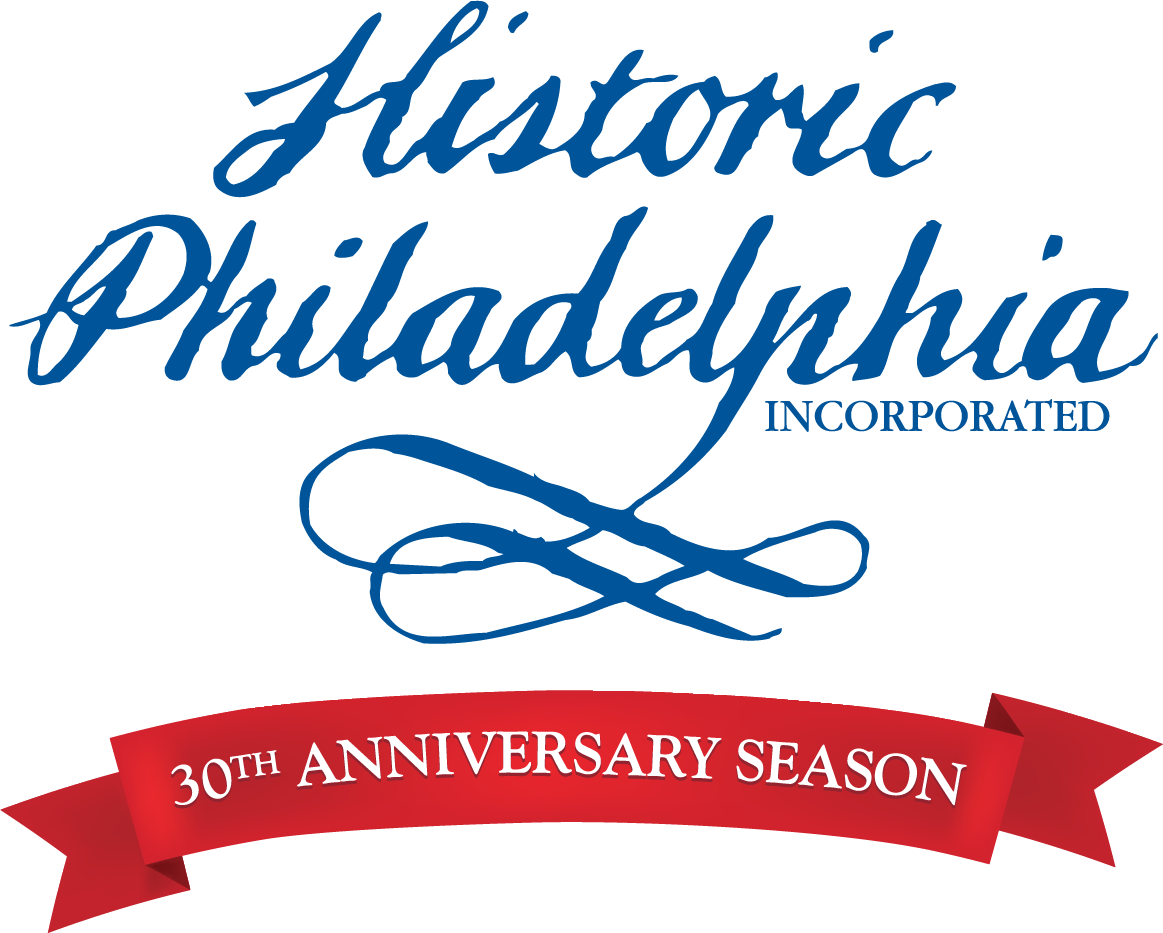
30 Years of Telling 300 Years of America’s Stories
If you had been roaming around Philadelphia’s historic community 30 years ago, you wouldn’t have encountered Ben Franklin, Betsy Ross, or James Forten. You wouldn’t have ventured near the abandoned Franklin Square. And you wouldn’t have heard stories about well-known and unsung heroes that shaped our nation. There were few resources to help visitors explore and immerse themselves into the centuries of history living within America’s Most Historic Square Mile.
Today, with preparations for the 2026 celebrations of our nation’s 250 birthday in full swing, the millions of people who live in and visit the area can chat with some of the 18th century’s most interesting residents, ride a colorful carousel in green, leafy Franklin Square or settle in on the curved benches throughout the district and be enthralled by authentic stories from America’s past.
So, what was the catalyst behind historic Philadelphia’s transformation?
A REVOLUTIONARY APPROACH TO AMERICA’S REVOLUTIONARY ERA
It was 1994 when then-Mayor Edward G. Rendell tapped Karen Butler to lead Historic Philadelphia, Inc. (HPI), a new non-profit organization charged with enlivening America’s Most Historic Square Mile. Over the last 30 years, HPI has more than met that goal.
Stretching every dollar of a shoestring $500K city grant, HPI launched its first season with 60 costumed actors performing “playlets,” short street theater performances recounting scenes from the nation’s earliest days. HPI took over management and revised the interpretation at the Betsy Ross House. They hired the city’s premier Ben Franklin interpreter to regale visitors with stories about his life. And they introduced the popular Military Muster which inspired thousands of proud parents to snap pix of General George Washington “inducting” their youngsters into the Continental Army.
Over the next few years, HPI added more tours, more performances and, in 2000, was actively involved in producing events for and participating in festivities celebrating the new Millennium. And in 2004, a change in leadership brought Amy Needle on as President and CEO and a new vision for HPI.
By the following year, under Amy’s direction and in partnership with the National Park Service, HPI launched Once Upon a Nation (OUAN), a menu of new programs that blended deeply researched facts and fun for a fascinating peek into the past.
Storytelling Benches popped up at 13 locations throughout the Historic District where HPI’s trained storytellers entertained visitors with 3-5 minute accounts of real people and real events covering 300 years of American history.
Costumed colonial interpreters roamed the district, mixing and mingling with visitors and sharing details of their 18th-century lives. The Tipple’s Tour and Independence After Hours offered informative, interactive and lively evening entertainment. The Betsy Ross House introduced a new exhibit. And at the foundation of each activity was the newly created Benstitute, an intensive, immersive training program that provided the reenactors and storytellers with accurate historic research.
Energized by Once Upon a Nation’s impact on the historic district, HPI has spent the next 30 years taking on more challenges and creating fun activities and traditions that are built on America’s many diverse stories.
AUTHENTIC HISTORY, LEGENDARY FUN
Spurred on by visitors’ excitement over Once Upon A Nation’s initial historical programs, HPI dove even deeper into our nation’s diverse stories and expanded its offerings. Drawing on the events that took place in Valley Forge in 1777, HPI introduced Once Upon A Nation Storytelling Benches and Adventure Tours at Valley Forge National Historical Park. The following year, OUAN published some of its most popular stories in the hardback book “Patriots, Pirates, Heroes & Spies: Stories from Historic Philadelphia.”
Over the next few years, OUAN grew and grew, adding stories about the Underground Railroad, battles over free press, gay rights, and women’s rights, all dating back to the 18th and 19th centuries. Visitors got a glimpse into 18th-century activities at Colonial Stations where costumed History Makers demonstrated Colonial crafts, music and games. Several of the city’s history and cultural groups commissioned the highly respected Benstitute to lead training programs for their staff, enabling them to offer a richer experience at their venues.
HPI invested heavily in creating fun and informative OUAN programs for young visitors. The Secrets & Spies tour gave youngsters a chance to be a history sleuth in Valley Forge. Full Day Field Trip programs offered free educational activities for students in underserved schools. In 2015, Once Upon A Nation introduced the Future Storyteller Contest in which students submitted researched and submitted stories about their favorite person from history. The winners performed their stories at Storytelling benches throughout the historic district.
And HPI didn’t let Covid restrictions interfere with their efforts to share some of America’s most surprising and interesting stories. With a few clicks on a keyboard, OUAN’s Storytellers and costumed History Makers popped up on thousands of computer screens, sharing some of America’s most interesting and surprising stories.
FROM EYESORE TO “I’LL SEE YOU AT FRANKLIN SQUARE”
In 2006, after taking over management of Franklin Square, HPI raised more than $6.5 million to transform William Penn’s original 7-acre park from a sketchy no man’s land into one of the city’s most treasured assets. The themed Philly Mini-Golf, the Philadelphia Park Liberty Park Carousel, the award-winning playground, and the beautifully restored fountain became the go-to spot for residents and visitors seeking a calming, green urban respite. As HPI’s vision for Franklin Square grew, they introduced An Evening in Franklin Square as an annual fund-raiser that supports many of the Park’s free family programs.
To satisfy spur-of-the-moment picnics and offer food options for the surrounding businesses and neighborhoods, SquareBurger came on board as a permanent operation a few years later. Responding to popular demand for a permanent, all-weather events venue in 2012, HPI opened The Pavilion, which has been the site of countless birthday parties, community meetings, showers, and other gatherings.
Adding to an already busy line-up of family-friendly events such as the PumpkinFest, in 2013, Franklin Square added a new tradition to the city’s holiday festivities, the Electrical Spectacle light show and the Lightning Bolt Holiday Express, providing a festive train ride through the Square.
Franklin Square’s 10th anniversary was an especially busy year for HPI. They upgraded the Living Flame Memorial and worked with Tree Philly to plant additional trees throughout the park. But the big highlight was the Philadelphia Chinese Lantern Festival, the first in the Northeast US. Situated on the fringes of Chinatown, the Lantern Festival celebrated Chinese arts and culture, and has become an annual tradition. And there was more to come. In 2019, HPI undertook further renovations on the 181-year-old fountain. They added some razzle-dazzle and launched a free, choreographed water spectacular with lights and music. The Franklin Square Fountain Show continues to run year-round
BETSY GETS HER DUE
Since HPI’s inception 30 years ago, they have been caretakers of the Betsy Ross House, one of the nation’s few historic houses interpreting the stories of colonial women. HPI’s research has revealed new information about Betsy, her life as a widow, a mother, and a businesswoman. That research has shaped three decades of exhibits, events, and programs.
With funding from American Express in 2010, HPI began removing Plexiglass barriers throughout the House, opening up the nation’s one and only working 18th-century upholstery shop. (Quick aside. Although most refer to Betsy as a seamstress, in reality, she was an upholsterer). In 2013, with a Coby Foundation grant, House staff researched 18th-century upholstery techniques and eventually used them to hand-stitch all the fabric furnishings in the house. Even today, Betsy Ross interpreters use the same authentic hand-stitching techniques for projects commissioned by other historic venues.
More research led to a multi-year effort to align the exhibits and programs with their findings. A new interactive “Kids Kitchen” was equipped with kid-sized “utensils” in the basement, giving young visitors a glimpse into life before microwaves. A new Colonial medicine garden was accompanied by an exhibit showing how leeches, bugs, and garden plants treated everything from colds to cancer. Numerous changing exhibits depicted the experiences of the diverse women who juggled working, child-rearing, businesses, and managing a household during the Revolutionary era.
Two ventures have become favorite traditions: the January 1 Betsy’s Birthday Bash, celebrating the upholsterer’s birthday and Flag Fest, a street fete honoring Flag Day. And the Mother’s Day “Tea Party with Betsy” has been a sell-out event since its inception.
Just as Betsy persisted through the hardships of her widowhood, HPI persisted through the hardships of the Covid years, with Betsy Ross interpreters appearing in online video tours and narratives of her life. And just as life was resuming a sense of normalcy, in 2022, the Betsy Ross House was awarded a grant from the National Endowment for the Humanities for a new program, Meet the Women of 18th Century Philadelphia. Visitors could interact with women from the last half of the 18th century who represented the religious, political, economic, and racial diversity of the city of Philadelphia.
FROM PAST TO PRESENT TO FUTURE
Recognizing that today and tomorrow are as important as yesterday, HPI is actively engaged in developing authentic programs and activities that will continue to engage and entertain visitors well into the future. A key partner in America’s 250th birthday festivities in 2026, HPI is already working on programming.
Meanwhile, HPI’s historians are continuing their research to develop more Once Upon A Nation stories that reveal a deeper understanding of the diverse people and complex issues that shape our nation.
Franklin Square, where people still gather around the newly renamed Rendell Family Fountain, will soon be even more visitor-friendly. PATCO’s construction on the renovated Franklin Square Station is on track for a 2024 opening, making it easy for residents and visitors to enjoy the park. The playground is slated for a make-over with new equipment. And the planned new restrooms will be a welcome addition to Franklin Square.
At the Betsy Ross House, interpreters are already hard at work on commissions from Independence National Historical Park to stitch furnishings for the Todd House. And as research continues to reveal more info about Betsy and other women of the colonial era, more diverse exhibits are in the works.
